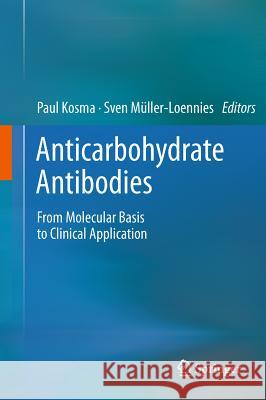Anticarbohydrate Antibodies: From Molecular Basis to Clinical Application » książka
Anticarbohydrate Antibodies: From Molecular Basis to Clinical Application
ISBN-13: 9783709108697 / Angielski / Twarda / 2011 / 456 str.
Many pathogens and aberrant malignant cells express unique carbohydrates on their surface representing attractive targets for vaccine design. Considerable progress has recently been made in the identification of novel carbohydrate based vaccines and a large number has reached clinical phase studies. The success of several licensed carbohydrate based vaccines against bacterial pathogens such as Haemophilus influenzae type b, Neisseria meningitidis or Streptococcus pneumoniae demonstrates their great potential. However, the study of anti-carbohydrate antibodies is technically challenging and partly because of low affinities and promiscuous specificity they have not been medically exploited to full potential. The study of antibody specificities and identification of protective carbohydrate epitopes lies at the heart of successful vaccine design. In addition to therapy, antibodies in general serve as diagnostic tools in medical and scientific laboratories. In this setting high affinity and exquisite specificity are important factors for their successful use. Anticarbohydrate Antibodies from molecular basis to clinical application compiles current knowledge on the immunological recognition of carbohydrates by the adaptive immune system from a molecular perspective providing fundamental insight needed for advancing clinically relevant diagnostics and therapeutic applications. Based on significant progress in the fields of glycoimmunology and structural biology in recent years, the book comprehensively reviews the state-of-the-art in defining the key elements of carbohydrate recognition by antibodies, the molecular mimicry of carbohydrate epitopes as well as the molecular features leading to specific and relaxed binding modes. Backed-up by a combination of modern technologies to elucidate structural details of carbohydrate-antibody interactions, biomedically important carbohydrate antigens from viral, bacterial, parasite, insect and tumor cells have been analyzed in in-depth reviews written by well-known experts in the field. Fundamental knowledge of these molecular mechanisms eventually provides a rational basis to improve efficacy of carbohydrate-based vaccines and to further refine diagnostic tools in detection of pathogens and malignant cells."
Many pathogens and aberrant malignant cells express unique carbohydrates on their surface representing attractive targets for vaccine design. Considerable progress has recently been made in the identification of novel carbohydrate based vaccines and a large number has reached clinical phase studies. The success of several licensed carbohydrate based vaccines against bacterial pathogens such as Haemophilus influenzae type b, Neisseria meningitidis or Streptococcus pneumoniae demonstrates their great potential. However, the study of anti-carbohydrate antibodies is technically challenging and partly because of low affinities and promiscuous specificity they have not been medically exploited to full potential. The study of antibody specificities and identification of protective carbohydrate epitopes lies at the heart of successful vaccine design. In addition to therapy, antibodies in general serve as diagnostic tools in medical and scientific laboratories. In this setting high affinity and exquisite specificity are important factors for their successful use. Anticarbohydrate Antibodies from molecular basis to clinical application compiles current knowledge on the immunological recognition of carbohydrates by the adaptive immune system from a molecular perspective providing fundamental insight needed for advancing clinically relevant diagnostics and therapeutic applications. Based on significant progress in the fields of glycoimmunology and structural biology in recent years, the book comprehensively reviews the state-of-the-art in defining the key elements of carbohydrate recognition by antibodies, the molecular mimicry of carbohydrate epitopes as well as the molecular features leading to specific and relaxed binding modes. Backed-up by a combination of modern technologies to elucidate structural details of carbohydrate-antibody interactions, biomedically important carbohydrate antigens from viral, bacterial, parasite, insect and tumor cells have been analyzed in in-depth reviews written by well-known experts in the field. Fundamental knowledge of these molecular mechanisms eventually provides a rational basis to improve efficacy of carbohydrate-based vaccines and to further refine diagnostic tools in detection of pathogens and malignant cells.











